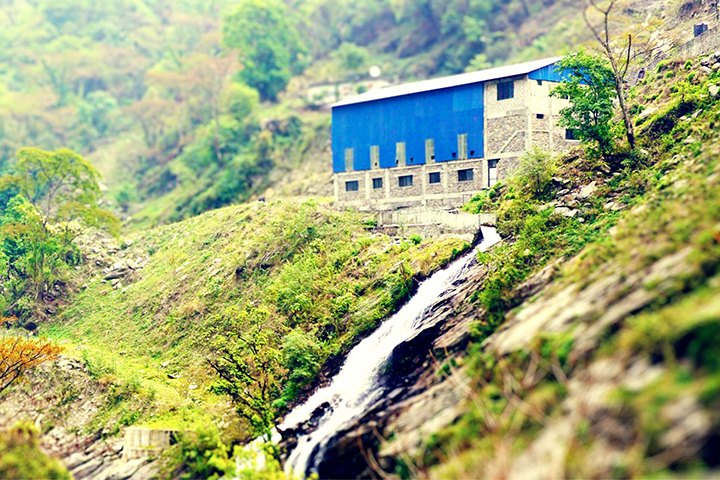Four newly awarded sustainability catalyst grants are piloting innovative methodologies to bolster climate resilience and sustainability. The projects are funded by the Graham Sustainability Institute.
Engaging researchers from 11 units at the University of Michigan, in collaboration with a diverse array of partners, these projects will explore renewable energy deployment in Nepal, climate justice in the Midwest, textile recycling innovation, and equitable transportation planning.
Atiyya Shaw, assistant professor of Civil and Environmental Engineering, is the principal investigator of a project focused on addressing biases in transportation infrastructure planning, particularly the underrepresentation of marginalized groups in survey data. The project includes a comprehensive analysis and collaboration with the Southeast Michigan Council of Governments (SEMCOG) and the Michigan Department of Transportation (MDOT).
“The catalyst grant has allowed us to initiate collaborations across campus and with regional transportation planning agencies, bringing together a strong methodological team alongside passionate, supportive external partners,” said Shaw.
“We aim to extend this collaboration beyond the project, working towards reducing transportation data biases and advocating for more sustainable transportation options in the Detroit area and farther from home."
Since 2017, Graham has provided sustainability catalyst grants to forty projects, fostering small-scale, collaborative, interdisciplinary sustainability research to build partnerships and lay the groundwork for user-driven research. Sustainability catalyst grants are open to all faculty and researchers across U-M’s three campuses. Each of the four featured research teams will receive $10,000.
"We're so pleased to support these innovative projects through our sustainability catalyst grant program," said Jennifer Haverkamp, Graham Family Director. "The projects chosen for this round of funding wonderfully embody our commitment to advance sustainability by working together, thinking creatively, and centering justice for high-impact solutions.”
To learn more about the new projects, read on and visit the project web pages linked below.
Energizing Nepal
Developing a Research Agenda to Guide Sustainability Transitions

Amid rapid hydroelectric expansion, Nepal is transforming its energy landscape, moving from biomass and fossil fuels to renewable energy. Rich in hydropower resources, the nation is eager to pursue its dream of producing abundant hydroelectricity that will make it prosperous while maintaining sustainability goals.
The hasty development of hydropower across Nepal has sparked debate over its implications for society, the economy, and the environment. To shed light on the complex factors influencing the country’s energy transition, this research team will collaborate with the Nepal Electricity Authority (NEA), the Ministry of Forest and Environment (MOFE), and other key stakeholders. Their aim is to highlight knowledge gaps and co-develop a research agenda that will contribute to a just and equitable energy transition and align with national development and climate goals.
The team will conduct a literature review and collaborate with partners to create and widely disseminate a report on the state of energy access in Nepal, modeled on similar reports for three countries in Southern Africa and expected to inform future research. Additionally, the team will hold webinars and interviews with researchers and practitioners to capture diverse perspectives on the challenges, opportunities, and knowledge gaps associated with Nepal's energy transition. Lastly, they will present their findings at conferences to advance this work and foster collaboration with new partners.
The lessons learned from Nepal's experience are applicable beyond its borders. Other countries undergoing similar energy transitions can utilize these insights to address concerns about access, availability, and affordability.
Project team: Pamela Jagger, PI (School for Environment and Sustainability); Rajiv Ghimire, Co-I (School for Environment and Sustainability); Uttam Sharma, Co-I (Center for Global Health Equity | Institute for Social Research); Noah Guberman (Literature, Science, and the Arts)
Immigrant Insights
How Community-Based Participatory Research Can Support Climate Change Mitigation

While the Midwest is often considered a potential haven in our changing climate, it is not immune to its effects—including increased heatwaves, extreme precipitation, droughts, and wildfires. This research team, which includes Until Justice Data Partners (UJDP) and U-M researchers, will use community-based participatory research (CBPR) principles to advance climate justice in the Midwest. The project will leverage UJDP's national influence and local ties in Louisville—a Federally Designated Refugee City—to help Louisville residents and leaders learn from their immigrant neighbors.
Designed as a pilot study, the research will support community members in sharing their climate adaptation stories and producing tailored outputs for residents, social service organizations, mutual aid networks, and other groups leading community climate resilience efforts. The team is committed to creating two specific products: “Lessons from Immigrants and Refugees in Our Changing Climate,” which will compile insights on adaptation strategies, and “Learning from Immigrants and Refugees in Our Changing Climate,” which will summarize the project process and partners. Additional outputs could include letters, presentations, and recorded media.
By elevating and sharing insights from Louisville's immigrant and refugee community, the research team aims to support project participants and promote their meaningful representation in local climate change initiatives. Additionally, the team seeks to create resources for similar research elsewhere, contributing to broader goals of climate justice and improved public health. If successful, this pilot project could expand to other Midwest or global communities working to mitigate the effects of climate change.
Project team: Natalie Sampson, PI (Environmental Health, UM-Dearborn); William Lopez, Co-I (Health Behavior and Health Education, UM-Ann Arbor); Monica Unseld (Until Justice Data Partners)
Mitigating Bias in Transportation Infrastructure Planning

To create sustainable and equitable transportation systems, decision-makers need access to accurate user data. Currently, the use of surveys in transportation planning suffers from inherent bias, often underrepresenting people of color and those with lower incomes, who are significant users of eco-friendly transportation like public transit, biking, and walking. This bias can lead to unnecessary road expansions and other misguided investments in infrastructure, diverting resources away from improving public transit, walking, and cycling options.
This research team, working with the Southeast Michigan Council of Governments (SEMCOG) and the Michigan Department of Transportation (MDOT), will analyze the biases in transportation survey data and propose alternative methodologies. Their goal is to produce a methodological guide to improve the integrity of transportation behavior data. They will conduct a quantitative investigation into national and state transportation household survey biases and a comprehensive comparison of sampling methods, instrument design, and post-processing corrections. They will focus on the Detroit metro area as a case study.
By systematically addressing biases in transportation data, the researchers aim to improve the accuracy of information used in infrastructure planning. Working with SEMCOG and MDOT ensures that their findings will inform the state of Michigan’s next phase of survey data collection starting in 2024. By sharing best practices, the project benefits will extend beyond southeast Michigan and guide transportation agencies nationwide toward more equitable and sustainable infrastructure planning.
Project team: Atiyya Shaw, PI (Civil and Environmental Engineering); Joe Grengs, Co-I (Urban and Regional Planning); Sunghee Lee, Co-I (Institute for Social Research)
Threads of Change
Using Smart Labels to Improve Textile Recycling

Textile waste in the United States has surged by 80% since 2000, making it among the fastest-growing waste streams. A 2017 report from the Ellen MacArthur Foundation estimated that less than 1% of clothing material is recycled, resulting in an annual loss of over $100 billion. Inaccurate fiber content information, primarily caused by missing or erroneous labels, is one of the main obstacles to large-scale recycling.
As a remedy, and building on this research team’s prior work, the researchers propose an integrated textile labeling system that provides accurate data on fiber content, dyes, and chemicals to ensure seamless information transfer from yarn and fabric manufacture to an item’s end-of-use. A version of the label has already been developed and is in the patent process. With this project, the team will prepare the label for widespread adoption by incorporating direct input from over 150 industrial end-users and leveraging the insights of the team’s industrial partner, Patagonia.
With proposed outputs that include protocols, samples, machine learning tools, and white papers, the project addresses textile circularity challenges with an industry-aligned approach. Key objectives include modifying fibers to use industry-relevant and recyclable materials, integrating them into knitted fabrics, and demonstrating low-cost, handheld readers for efficient identification. The shift to chemically-recyclable materials eliminates the need for manual label removal, while the integration into knitted fabrics aligns with the preferences of many clothing manufacturers. Designing a user-friendly fiber identification system aims to reduce barriers to adoption.
Project team: Max Shtein, PI (Materials Science and Engineering); Sean Ahlquist, Co-I (Architecture); Alanson Sample, Co-I (Electrical Engineering and Computer Science); Brian Iezzi, Co-I (Materials Science and Engineering.)